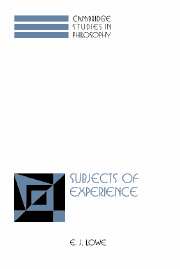7 - Self-knowledge
Published online by Cambridge University Press: 22 October 2009
Summary
As I indicated in section 2 of chapter 1, I favour an analysis of the concept of selfhood which ties it to the possession of certain kinds of first-person knowledge, in particular de re knowledge of the identity of one's own conscious thoughts and experiences. Here I want to defend this analysis more fully. My defence of it will then lead me to explore the nature of demonstrative reference to one's own conscious thoughts and experiences. Such reference, I shall argue, is typically ‘direct’, in contrast to demonstrative reference to all physical objects, apart from those that are parts of one's own body in which one can localize sensations or which are directly subject to one's will. My conclusion will be that the semantic distinction between ‘direct’ and ‘indirect’ demonstrative reference helps to delineate the metaphysical boundary between oneself and the rest of the world. But, consistently with what I have argued for elsewhere in this book, I do not contend that one is to be identified with one's own body: indeed, I shall offer additional reasons for thinking that one can know a priori that no such identity can obtain.
1. SELFHOOD AND FIRST-PERSON KNOWLEDGE
The question ‘What is the self?’ may be understood in two different ways – as a request for the meaning of the term ‘self’, or as a request for an account of the nature of the self. Theories of the nature of the self may differ widely – some, for instance, regarding it as a substance and others not, with some of those that do regarding it as a material substance while others regard it as immaterial.
- Type
- Chapter
- Information
- Subjects of Experience , pp. 182 - 203Publisher: Cambridge University PressPrint publication year: 1996



